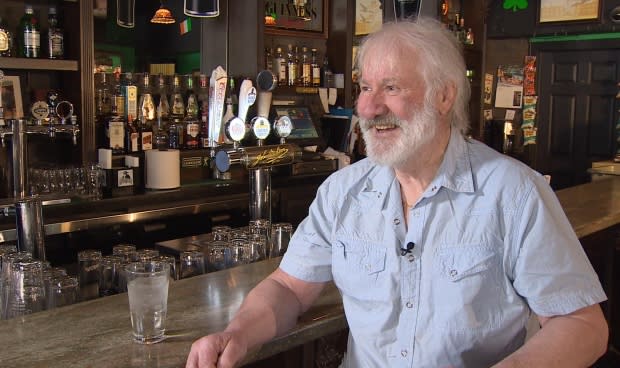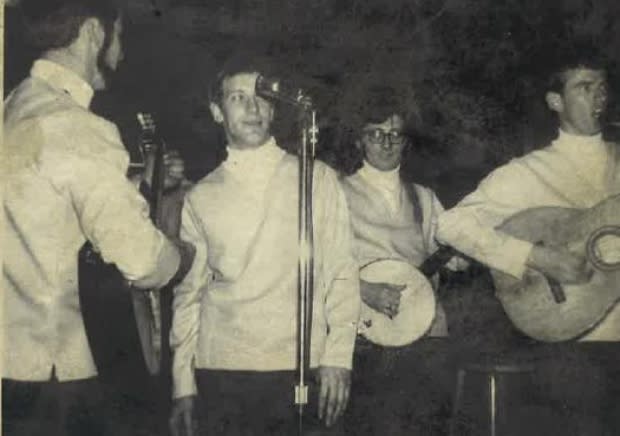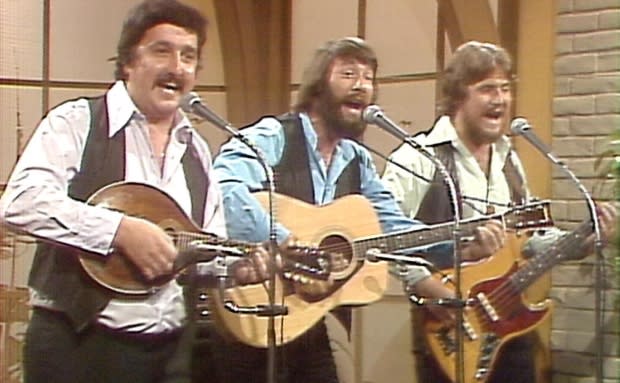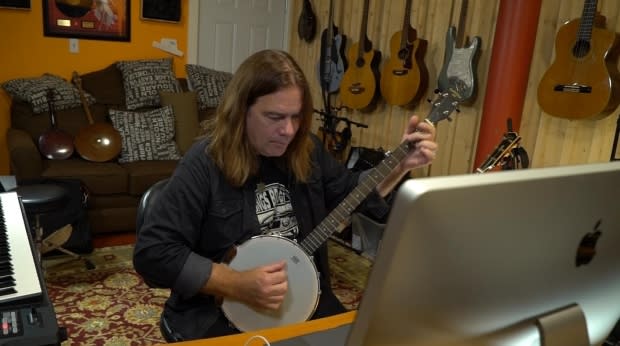How the Sons of Erin changed Newfoundland music forever
When Ralph O'Brien first stepped on stage with Sons of Erin in 1968, the Beatles were at the height of their fame. Led Zeppelin and Black Sabbath were just starting out. And traditional Irish music was more often performed in a kitchen than on stage.
Now, looking back after 50 years of performing on stages around the world, O'Brien can hardly believe his band is still going strong.
"It's really extraordinary, how quick it come," said O'Brien.
Getting paid in pints
O'Brien's life in the music business began while a young man in Dublin, hanging out in a pub.
"My friend Gary Kavanagh was going to Canada and I was a bit of a wanderer," O'Brien explained. "So I said to him, 'I'll see you there.'"
Months later, O'Brien stepped off a plane in Toronto. There, he and Kavanagh connected with another pair of Irish immigrants: musical pioneers Fergus O'Byrne and Dermot O'Reilly.
The four began jamming on traditional folk songs from their homeland, and decided to start a proper band. They called themselves Sons of Erin, "Erin" being Gaelic for "Ireland."

"We kind of started in the house, and I said, 'B'ys we should go down and play,' and the rest is history," O'Brien said. "We were getting free beer, which was 10 cents a draft. And you got five of them, and that was your pay."
From those humble beginnings, a great musical legacy was born.
O'Byrne and O'Reilly would go on to form the seminal Irish band Ryan's Fancy, while O'Brien continued performing with Sons of Erin.
The band's shifting lineup would come to include scores of notable musicians, including Chris Hennessy, Bob O'Donovan, Blackie O'Leary and D'arcy Broderick. The one constant was O'Brien.
"I was never a great musician. I was a vocalist and a frontman," said O'Brien.
The core of the band's sound has always been its lively interpretations of traditional Irish folk songs, including The Fields of Athenry and Won't Ya Come Down to Yarmouth Town.
"The songs that we done are standards now. Over the course of the years, they have become standards," said O'Brien. "They're good stories. Irish songs are good stories. You could talk them or you could sing them, and they would still be magic."
Erin's Pub: 'The salvation of the band'
O'Brien said the best move the band ever made was relocating to Newfoundland in the 1970s. Here, they found an enthusiastic audience for Irish music.

"There was an acceptance straightaway," said O'Brien. "There's a lot of people here of Irish extraction. So we took the music out of the kitchens, and put them on stage."
Not long after settling in St. John's, O'Brien made another decision that would affect his life and his music for decades to come. He opened his own club and venue, called Erin's Pub.
It was the first Irish pub of its kind in St. John's, and became an immediate success. It also gave the Sons of Erin a home for performing, and allowed them to cut back on their grinding schedule of lengthy tours.
"Erin's Pub was the salvation of the band," said O'Brien.

Throughout the 1980s and early 1990s, the bar became the centre of a burgeoning traditional music scene. Bands including Great Big Sea, Shanneyganock, the Irish Descendants and the Fables played some of their earliest shows on Erin's stage.
O'Brien operated the pub until 2012, when he passed the torch to Bob Hallett of Great Big Sea and Chris Andrews of Shanneyganock — Hallett is now sole owner.
Great Big Sea's Alan Doyle remembers those early days well.
"I think the biggest influence from those guys, on me early on, was the stagemanship that Ralph always had. He knew how to turn a noisy pub into a singalong, almost instantly," said Doyle.
"I have a deep respect for that craft, about how to turn a noisy bar into a great night out. And nobody did that better than Ralph."
Still going
The Sons of Erin's current lineup features Jason Simms on guitar, Steve Best on guitar, mandolin and bouzouki, Joe Thompkins on the piano and accordion, and John Barela on the bass.
Aside from O'Brien, Thompkins is the band's longest-serving member, having joined in 1989. Best is the rookie, having been part of the group a mere 20 years.
"The key element is Ralph's passion, Ralph's passion for traditional music and his connection with Ireland, and bringing a piece of Ireland to here," Thompkins said.

"The Sons of Erin, that's it. They're the only ones left," said Best.
"There's no Ryan's Fancy. There's no big, traditional Irish bands anymore. The Dubliners are done, everybody's done. And the Sons of Erin are still going. We're getting bigger."
This year, O'Brien was honoured with the MusicNL Lifetime Achievement Award in recognition of his contributions to the traditional music scene, both as a performer and a venue operator. At the ceremony in Twillingate, O'Brien accepted the trophy with pride.

"This award is 50 years for me," said O'Brien. "It's very nice that people appreciate what you've done, and how you've done it, through the course of the years."
Alan Doyle said he still appreciates watching O'Brien sing, and remains a fan of Sons of Erin.
"It's inspirational, in a way," he said. "There's no money that could make you do it. There's no great nights out, there's no sex, drugs and rock and roll that could make you do it that long.
"The only reason you would do it that long is because you love it. And you watch Ralph sing, it doesn't take very long before you go, he loves it. And that's beautiful."
Read more from CBC Newfoundland and Labrador

